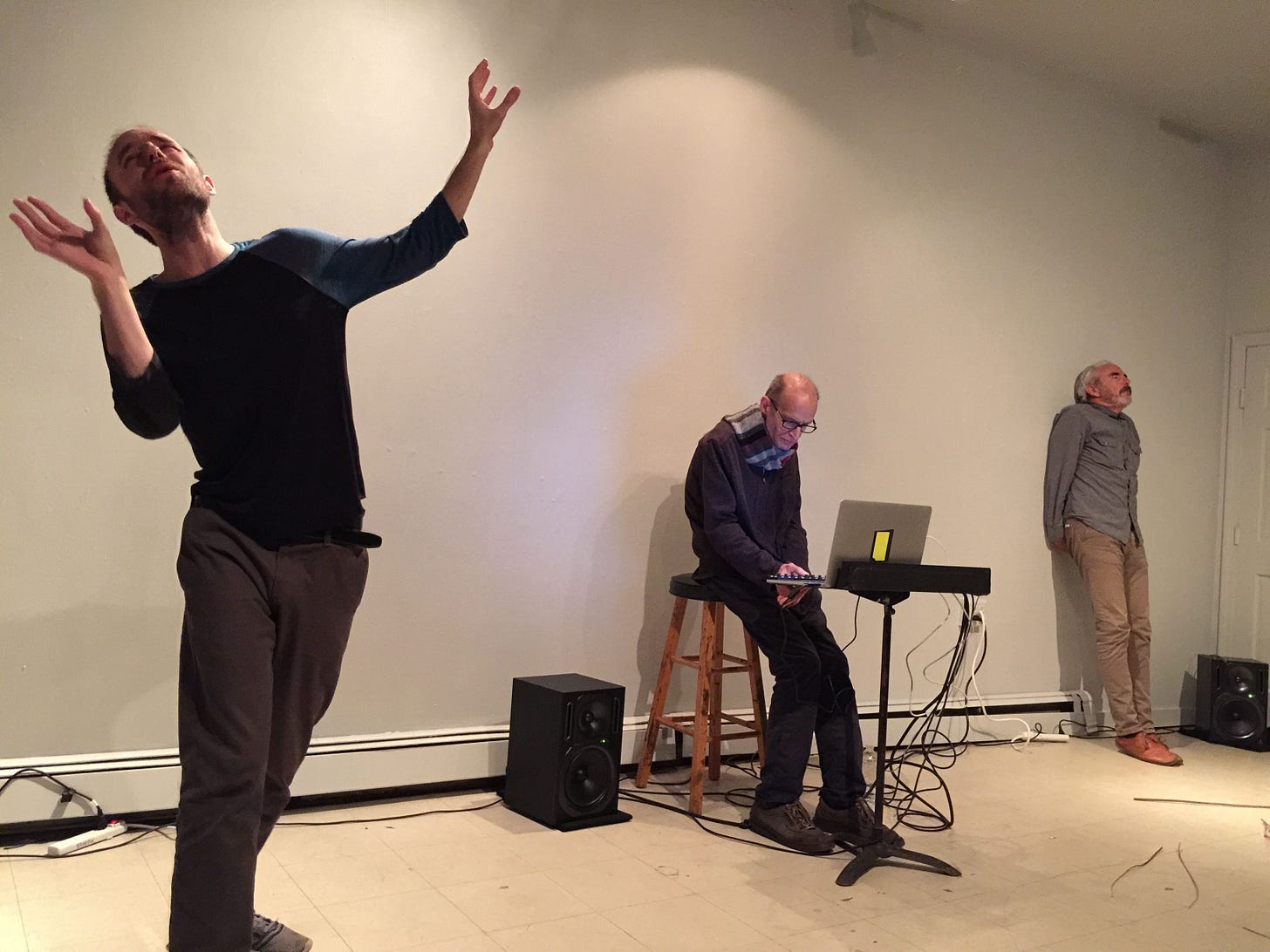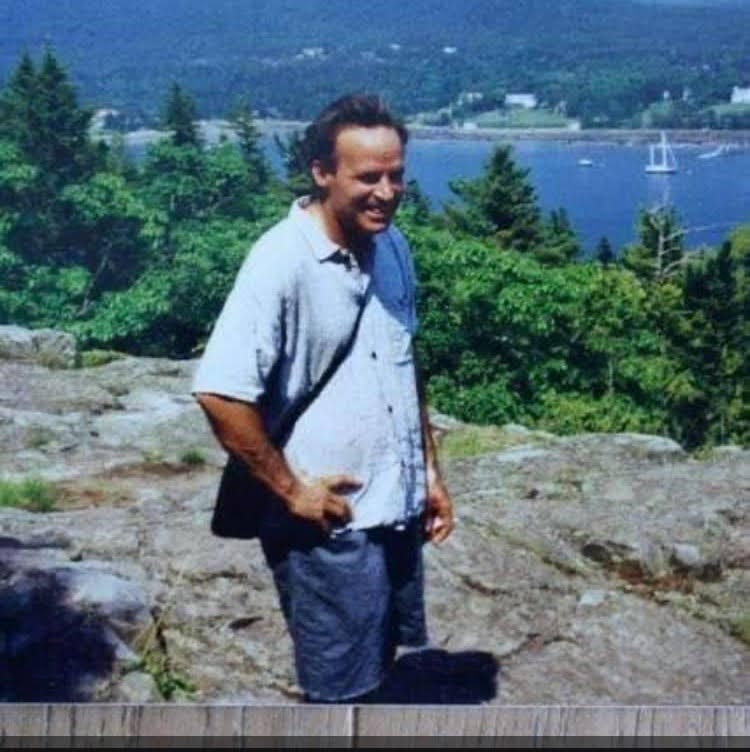“There came a time when I realized that I needed my father,” you told me, long before I really knew that I needed you.
Then, later, much later, I knew it. How I knew it! And, lucky me, you were there.
I still know it.
We’re not in linear time here. In linear time we were father-son, then distant, then very close, and performed together, then 8 years ago on March 22nd, your soul left your body.
But we’re in another kind of time now. I’m still telling stories about you, and your stories are still telling themselves to me and through me.
What follows below is one story of us.

When I was a young kid, I really admired my grandfather- my mother’s father, named George, but who I always knew as Granddaddy. I have so many precious memories of him. The white-collared shirts he wore. The Old Spice deodorant he wore. The way he drove around in an Oldsmobile in his tiny Connecticut town. The distinguished cameo ring he wore on his finger. The way he gave strong hugs, full of love, that in my four year old vocabulary I called “rough hugs.” I remember him driving me in his Oldsmobile to the fish market and he taught me what “salmon” was. I remember him cooking it on the grill, and how it was more delicious than anything else I had ever tasted, because Granddaddy taught me that this was “salmon.”
Granddaddy was a uniquely nurturing, loving, masculine presence, since my earliest memories. I remember him driving me around the parking lot of a Chinese restaurant as I stood up in the car with my head peeking out of the sunroof, as he laughed in his low bass-toned giggle: “heh-eh-eh-eh-eh.” I giggled likewise. Granddaddy was the image of a King to me; a loving father and grandfather. Just before I turned 7 in 1995, doctors found a grapefruit-sized tumor in Granddaddy’s colon shortly after his 64th birthday, and he was diagnosed with a rare, aggressive cancer of the smooth muscle tissue. He died three months later- the first person I loved dearly through whom I encountered mortality and death.
Granddaddy was a kingly image for me in a way that my father was not while I grew up with divorced parents. At the time, the dominant narrative of my father centered on his clinical depression and his poor living conditions due to having chosen the artistic life in the United States of Capitalist America. My father was a composer, multidisciplinary artist and Boston arts administrator who probably made about $1,000 per month or less. I grew up with two artist parents, but my extended family talked about my father as if he fell short. That he couldn’t afford to support me. In fact, my mother would sign child support checks back to him. My Dad used to say, “Don’t make too big a deal out of Father’s Day because, well, I haven’t been a very good father.”
And so my relationship with my dad growing up was one of Love but also Grief; Love, but also, garbage bags piled up inside his apartment; Love, but also, undercooked batter that dribbled out of the sides of the pancakes; Love, but also, scum that covered the pond outside his ramshackle apartment; Love, but also, raccoons and squirrels in the attic that he said were depressing and degrading him; Love, but also, feeling my father’s sadness while hearing him cry.
And so it was Granddaddy who, at the time, I considered a nurturing, loving, safe paternal presence. This continued even after Granddaddy died- I emulated Granddaddy even into my teenage years, when I learned that Granddaddy was a Republican. I learned Ayn Rand was one of his favorite writers; I learned Ronald Reagan was his presidential hero. I learned that early in my parents’ relationship, when Granddaddy found out my Dad was a composer & artist, he said, “that’s great, if you have an emperor.” So I read Ayn Rand. I listened to Ronald Reagan’s speeches and I tried to be moved to tears. I argued with Dad about politics over pizza: my Dad, on the frontlines of planning the latest grant to create more opportunities for artists; me, his son, defending neoconservatism and not knowing what I was talking about. I imagined myself dressing like Granddaddy dressed and walking the way he walked.
The only counterpoint was that my maternal grandmother, my mother’s mother- Nana- Granddaddy’s ex-wife, was still very much alive and an always-active presence in my life. And in Nana’s house up in northern New Hampshire, my cousins and I would sit at the table with Nana, into the wee hours of the night, and talk and talk, “solving the world’s problems,” as we called it.
Nana loved making formidable quips about her ex-husband.
Nana had these owl-like brown eyes that would burn with sassy, queen-like fury whenever she talked about Granddaddy (though she always called him George, or “your grandfather” in tones that suggested she thought it tragic that she needed to refer to him in speech). Nana didn’t remarry: in the late 1970’s, after their divorce, she remained single and was an active, outspoken feminist, with a passion for leading discussions on the Great Books. She taught English literature at the same place I attended high school growing up and was a brilliant storyteller. Granddaddy, on the other hand, did remarry- he married the woman who had served as his secretary in his fiber-optics company.
One night, when I was around 10 or 11, at Nana’s table, I began to feel sore about Nana’s verbal jabs at Granddaddy’s character. She’d say things like, “I remember one day your grandfather was holding a Polaroid camera, and said, ‘any damn fool could work one of these!’…and then he couldn’t.” Little, subtle incriminating statements like that.
I felt sore about this and had so many questions, and one night, I blurted out to her:
“But Nana- George loved his daughters, right?”
I was asking if she would at least concede that Granddaddy had loved my mother and my two aunts. Nana took a deep breath, stood up from the kitchen table, and turned around, walking over to the dishwasher. Her breathing was heavy: she had a form of emphysema, which also gave an additional gravitas to everything she said. As she began to empty the dishwasher, she slowly said in hushed tones, “George loved his daughters…” and I could have sworn I heard her concede, “yes…” which I took as permission to feel relieved that she was giving him credit where I thought it was due. But then, there was a minute of total silence- the only sound I could hear was the sound of Nana emptying the dishes out of the dishwasher.
And she paused, turned her head, and said:
“No, Nate.”
“No, Nate. He didn’t.” She turned around. Approached the kitchen table. This time, her brown eyes weren’t lit up with that sassy pleasure. They were teary- she knew she was saying something heavy to me, and felt delicate about it.
She sat down, swept her wrinkled hand across the table cloth as if to brush crumbs away, and she said:
“your grandfather was a millionaire. He retired early. And all of his daughters were struggling. They were struggling with money, and they were struggling as mothers to raise children. But when he died, he didn’t leave his daughters a single penny of his millions. He left it all to his second wife. And so it brings me no pleasure to say this to you, but, I think that if he had loved his daughters, he would have made sure they had some inheritance money.”
At the time, I didn’t really understand what money was. I still don’t really understand what money is. I knew what homelessness was, though, because my mom and I had been homeless. I remember first hearing the word “homeless” in my mom’s car after we had been kicked out of the house of her ex-partner. And I knew that my dad had struggled with capitalism, and the economy, and money, and so I knew that money was somehow connected to home, and to homelessness, and at the moment Nana told me that Granddaddy didn’t love his daughters, a cognitive caesura began widening into a gaping wound about my (inno-)sense of Granddaddy as a loving, masculine presence.
Years later, I found myself in a Yoga studio in my first year of college, and my teacher, Gabriel Halpern, who was a yogi born in 1948, used to exclaim, “I am always proud to say that I am a hippie. Still am!” He would passionately impart mythological wisdom to us as we held Warrior Pose, and others poses, on our Yoga mats, saying, “connect with your ancestors! You’re standing on the blood and bones of your ancestors! Connect with your ancestors! Take responsibility for your life!”
One day, Gabriel introduced us to the teachings of the poet Robert Bly, who founded the mythopoetic men’s conferences. Bly talked about ‘fathering,’ and valuing the kind of fathering you’ve received in your life. There are interviews with Bly where he says, “a lot of people are critical of their fathers, is that right? But what about the fathering you did receive? What kind of blessing did you receive from your father? Is that right? What blessing from your father did you receive?”
Something about this way of thinking catalyzed a complete cognitive reversal in me. What blessing from your father did you receive? The question didn’t leave me alone. Reframing the silence and grief between fathers and sons as blessings that could be revitalized- it was a perspective I knew deep in my core to be true.
And in a seemingly sudden way, I realized that I had been all wrong up until then. I had been all wrong to try and be moved to tears by Ronald Reagan. I had been all wrong to emulate Granddaddy and read Ayn Rand voraciously. I had been all wrong to cop to the falsely conditioned narrative of my father centering on his depression and framing it as a failure to ‘provide’ as a father.
I was wrong about all of it. I was wrong to exalt this capitalist dogma.
The next time I went home to visit my father, when he opened the door to that apartment that probably had garbage bags piled inside of it, as we were standing in the doorway, he said to me:
“Look, Nate. Nate. Look, I believe that because of what artists provide to the community, they’re entitled to certain benefits and social services.” And then he took a deep breath and said, “Look, I don’t feel like I need to apologize for the way that I’ve lived.”
A profound respect for him hummed in me at that moment, one that was always there, dormant, but that at last, sang deep in my bones. And I took a long pause, and a deep breath, that kind of silence, that long silence that sometimes passes between fathers and sons, and I said:
“Dad? I’m proud to be your son.
I’m proud to be your son.”
And we remained friends, and very close, all the way up to my father’s passing in 2016.



Sublime stark and stunning - a tribute to artists, your Dad and the wonder of growth in the most frayed of relationships